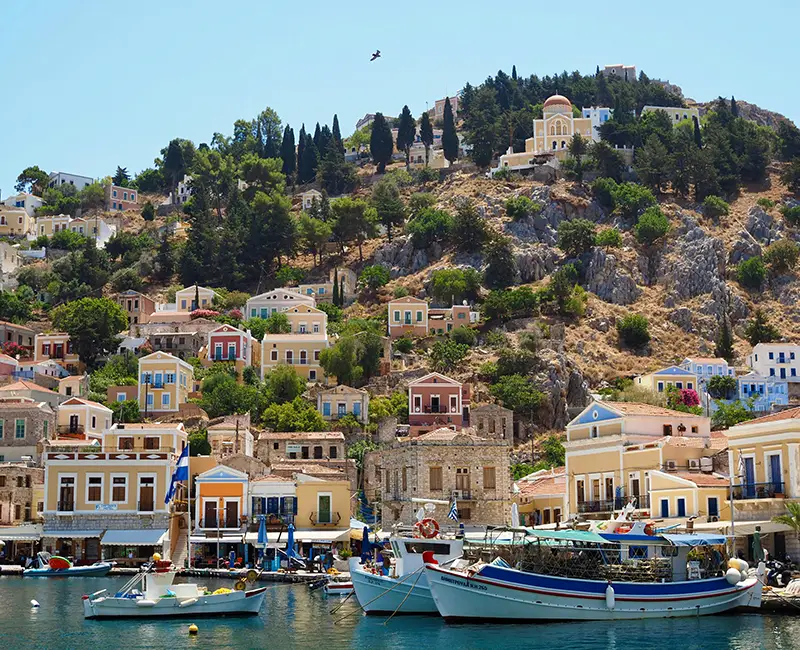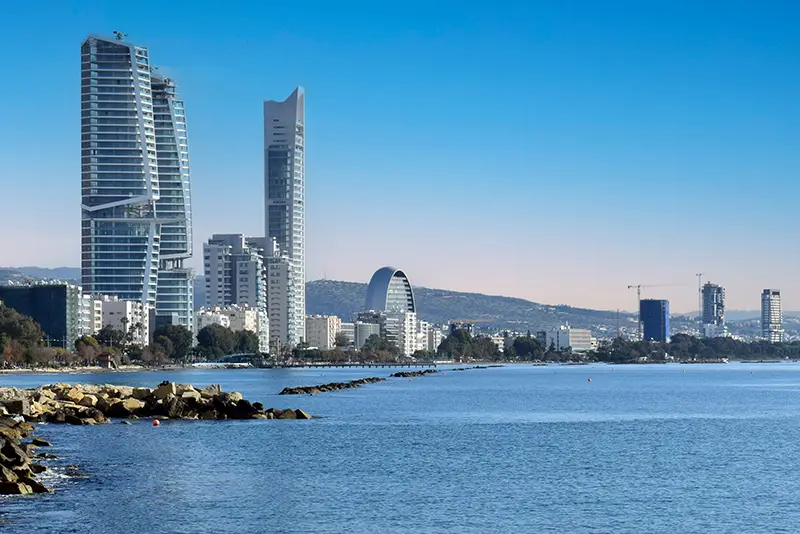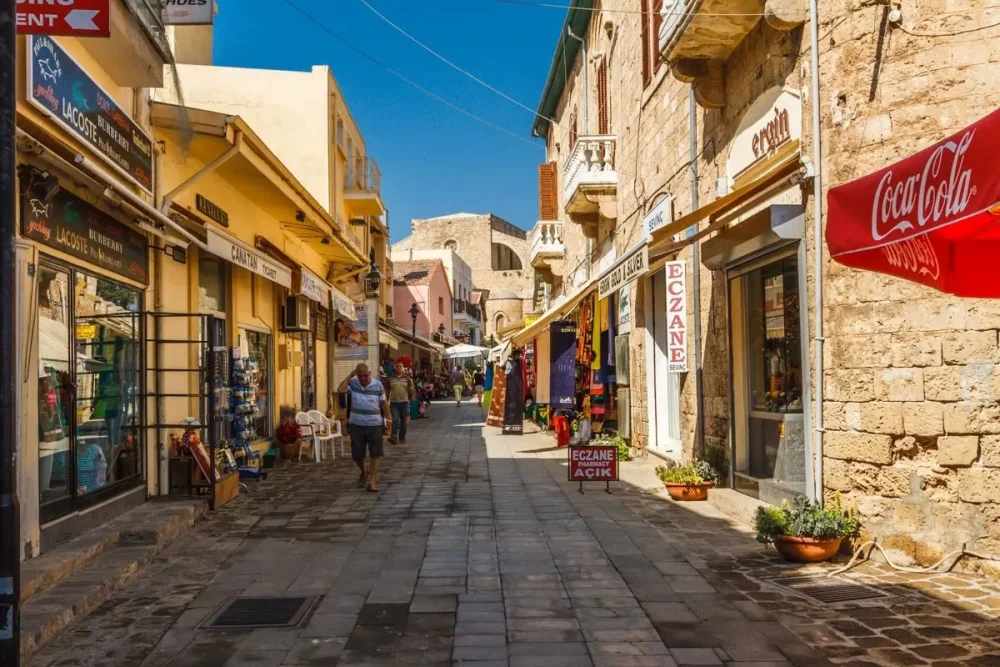Property in Cyprus offers great opportunities for those looking for a secure investment or planning a move to Europe. Average house prices range from €100,000 for apartments in Larnaca to €1,000,000 for premium villas in Paphos. Why many people consider the island an ideal place for long-term investments – we will tell you in the article.

Pros of investing in property in Cyprus
The island epitomises a unique combination of a stable economy and high standards of living. EU membership provides access to European markets, while its favourable geographical position between Europe, Asia and Africa makes Cyprus a key transport hub. The city of Paphos stands out for its high demand for tourist property, while Limassol attracts business people due to its developed infrastructure and status as a business centre.
Popular types of property in Cyprus
The Cyprus property market includes a variety of properties: villas, flats, houses and flats. Modern apartments in Larnaca cost from €150,000, while spacious villas with sea views in Limassol are available from €500,000.
Advantages:
- Affordable loans. Most Cypriot banks offer mortgage programmes with low rates starting from 2.5% per annum.
- High rental yields. In the tourist areas of Paphos and Limassol rental income reaches 5-7% per annum.
- Energy Efficiency. New buildings on the island meet high standards of energy efficiency, which reduces utility costs.
- Infrastructure. Many complexes include swimming pools, fitness rooms, parking spaces and recreational areas, which increases the comfort of living.
- Investment Flexibility. Investors can choose between ready-made properties and properties under construction, saving up to 20% of the market price.
Promising areas of Cyprus for property investment
Investors are increasingly turning their attention to neighbourhoods with high price growth potential:
- Larnaca. Ideal for budget investments. Construction is actively underway here, which attracts buyers with affordable prices. New projects in Larnaca offer modern apartments with prices starting from 150,000 euros, and the international airport attracts tourists.
- Nicosia. The capital is the centre of business activity. The area of Cyprus attracts foreign companies and investors, which provides a steady demand for commercial property. The value of housing here has increased by 25% over the last five years, making it a favourable choice for long-term investments.
- Limassol. A major port city and business centre. Infrastructure includes modern offices, hotels and premium residential complexes. Villas in Limassol are priced from €500,000 and luxury apartments from €300,000. High rental yields make Limassol popular with investors.
- Paphos. One of the most picturesque and tourist developed areas. The high interest of tourists allows property owners to earn a stable rental income. Sea view villas start from 400,000 euros and apartments from 200,000 euros. Projects orientated towards eco-tourism are being actively developed here.
Legal aspects of buying a property in Cyprus
 The purchase process begins with the selection of the property and legal due diligence. The signing of the sale and purchase agreement takes place in the presence of a lawyer who checks the property documents. For payment, an account will be opened in a bank where the deposit will be kept. The transaction is finalised with the registration of the ownership right in the Land Registry. Legal control at every stage ensures safety and transparency.
The purchase process begins with the selection of the property and legal due diligence. The signing of the sale and purchase agreement takes place in the presence of a lawyer who checks the property documents. For payment, an account will be opened in a bank where the deposit will be kept. The transaction is finalised with the registration of the ownership right in the Land Registry. Legal control at every stage ensures safety and transparency.
Rules for Russian citizens
Russians can purchase property in Cyprus without restrictions. A valid passport, tax number and bank statement are required for registration. Buying property worth 300,000 euros or more allows you to obtain a visa to Cyprus. This entitles you to a long-term stay.
Nuances of purchase for Russians:
- Document Requirements. In addition to a passport, proof of source of income or a letter from an employer may be required.
- Visa process. It allows the property owner to stay in Cyprus for 180 days a year, and with investments of 2 million euros or more, it is possible to apply for citizenship.
- Peculiarities of banking operations. To transfer funds to Cyprus you will need to open an international account, this takes 1-2 weeks.
- Legal support. The lawyer’s services include checking all documents and ensuring the transparency of the transaction.
Taxes and additional expenses
The island’s tax system is characterised by loyalty to foreign buyers. For the first purchase of housing a reduced VAT rate of 5% instead of the standard 19% is applied. Stamp duty is 0.15%-0.2% of the value of the property. Buyers are also exempt from capital gains tax on the sale of a property if it was purchased before a certain date, making the system even more favourable. These incentives make property taxes in Cyprus particularly attractive to investors.
Maintenance costs
There are moderate costs associated with owning property in Cyprus:
- Utilities. Water and electricity are charged separately, on average 30-50 euros per month for apartments and 80-120 euros for villas.
- Grounds Maintenance. For villas, garden maintenance, pool cleaning and minor repairs are included, costing around €100 per month.
- Insurance. The recommended cost of the policy is between €200 and €400 per year, which covers the risks of property damage.
- Owners’ Association. There are monthly fees for apartment complexes, which can range from 50 to 150 euros.
Reasonable costs and a clear payment structure make property in Cyprus an attractive choice for investors and those planning to relocate to the island.

Conclusion
 Investing in property in Cyprus offers a wealth of opportunities, from stable income to easy access to the European market. Rising house prices, a loyal tax policy and a stable economy create ideal conditions for long-term investments. The average increase in the value of properties reaches 10-15% annually, which makes buying square metres in Cyprus not only a safe but also a profitable strategy.
Investing in property in Cyprus offers a wealth of opportunities, from stable income to easy access to the European market. Rising house prices, a loyal tax policy and a stable economy create ideal conditions for long-term investments. The average increase in the value of properties reaches 10-15% annually, which makes buying square metres in Cyprus not only a safe but also a profitable strategy.
 en
en  de
de  ar
ar  es
es  nl
nl  hi
hi  fr
fr  it
it  pt
pt  el
el 









